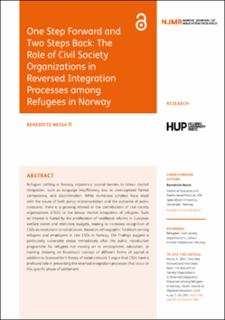| dc.contributor.author | Nessa, Benedicte | |
| dc.date.accessioned | 2023-12-14T12:35:21Z | |
| dc.date.available | 2023-12-14T12:35:21Z | |
| dc.date.created | 2023-08-25T09:58:15Z | |
| dc.date.issued | 2023 | |
| dc.identifier.citation | Nordic Journal of Migration Research. 2023, 13 (3), Artikkelnr: 4, 1-18 | en_US |
| dc.identifier.issn | 1799-649X | |
| dc.identifier.uri | https://hdl.handle.net/11250/3107605 | |
| dc.description | This is an open-access article distributed under the terms of the Creative Commons NonCommercial-NoDerivatives Attribution 4.0 International License (CC-BY-NC-ND 4.0), which permits unrestricted distribution, and reproduction in any medium, provided the original author and source are credited, the material is not used for commercial purposes and is not altered in any way. See https:// creativecommons.org/ licenses/by-nc-nd/4.0/ | en_US |
| dc.description.abstract | Refugees settling in Norway experience several barriers to labour market integration, such as language insufficiency, low or unrecognised formal competence, and discrimination. While numerous scholars have dealt with the issues of both policy implementation and the outcome of public measures, there is a growing interest in the contributions of civil society organizations (CSOs) to the labour market integration of refugees. Such an interest is fueled by the proliferation of neoliberal reforms in European welfare states and restrictive budgets, leading to increased recognition of CSOs as resolutions to social issues. Based on ethnographic fieldwork among refugees and employees in two CSOs in Norway, the findings suggest a particularly vulnerable phase immediately after the public introduction programme for refugees not moving on to employment, education, or training. Drawing on Bourdieu’s concept of different forms of capital in addition to Granovetter’s theory of social network, I argue that CSOs have a profound role in preventing the reversed integration processes that occur in this specific phase of settlement. | en_US |
| dc.language.iso | eng | en_US |
| dc.publisher | Helsinki University Press (HUP) | en_US |
| dc.rights | Attribution-NonCommercial-NoDerivatives 4.0 Internasjonal | * |
| dc.rights.uri | http://creativecommons.org/licenses/by-nc-nd/4.0/deed.no | * |
| dc.subject | Norway | en_US |
| dc.subject | labour market integration | en_US |
| dc.subject | civil society organizations | en_US |
| dc.subject | refugees | en_US |
| dc.title | One step forward and two steps back: The role of civil society organizations in reversed integration processes among refugees in Norway | en_US |
| dc.type | Peer reviewed | en_US |
| dc.type | Journal article | en_US |
| dc.description.version | publishedVersion | en_US |
| dc.rights.holder | © The Author(s) 2023. | en_US |
| dc.source.pagenumber | 18 | en_US |
| dc.source.volume | 13 | en_US |
| dc.source.journal | Nordic Journal of Migration Research | en_US |
| dc.source.issue | 3 | en_US |
| dc.identifier.doi | 10.33134/njmr.580 | |
| dc.identifier.cristin | 2169539 | |
| dc.source.articlenumber | 4 | en_US |
| cristin.ispublished | true | |
| cristin.fulltext | original | |
| cristin.qualitycode | 1 | |

